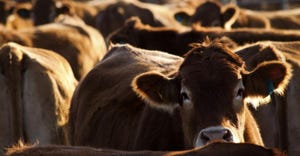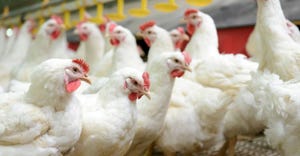Reports indicate soybean and pork purchases could help advance discussions ahead of October talks.

News Friday that China was lowering its punitive tariffs on U.S. pork as well as making a purchase of 600,000 metric tons of U.S. soybeans Thursday offered a big boost to a tattered U.S. agriculture sector caught in the middle of the over-year long trade war with China.
“We cannot speculate on China's plans regarding postponing or exempting soybeans from tariffs, but we can say we are pleased that China announced this week that it will purchase ag products again, and expected movement for soybeans to China has been reported,” said Wendy Brannen, communications director for the American Soybean Assn. (ASA).
“We take these developments as a show of good will from China prior to U.S. and Chinese officials resuming negotiations in early October, and ASA is hopeful this will lead to meaningful progress towards permanent resolution,” Brannen added.
Ahead of the reports, President Donald Trump tweeted Thursday that China would be buying large amounts of agricultural products, but that has been said before without any evidence.
It is expected that China will be buying large amounts of our agricultural products!
— Donald J. Trump (@realDonaldTrump) September 12, 2019
However, the Sept. 12 soybean purchase was the largest one since June -- a reversal from the Chinese ministry’s statement in August that it was stopping all purchases of U.S. agricultural products. Private exporters reported to the U.S. Department of Agriculture more soybean sales to China totaling 7.5 million bu. for delivery during the 2019-20 marketing year, which began Sept. 1. That’s on top of the Sept. 12 announcement for 22.0 million bu. to China.
“It is hoped the U.S. side can keep goodwill reciprocity with China through practical actions,” Global Times editor-in-chief Hu Xijin said in a tweet shortly before the move was announced.
Based on what I know, Chinese govt encourages Chinese companies to buy certain amount of US farm products, including soybeans and pork, which will also be exempted from additional tariffs. It is hoped the US side can keep goodwill reciprocity with China through practical actions.
— Hu Xijin 胡锡进 (@HuXijin_GT) September 13, 2019
China and the U.S. have agreed to hold trade talks in October, offering some optimism that a solution can be found. Trump said he would consider doing an “interim deal” with China after suggestions that his team was pitching the idea to reduce tensions with Beijing, China. Trump said Wednesday that he would hold off on imposing a scheduled tariff hike on $250 billion of goods from the current 25% level to 30%. The tariffs would go into effect on Oct. 15, two weeks later than originally stated.
U.S. pork purchases currently face a tariff of 72%. China remains a major consumer of pork and has been forced to look outside its borders to meet domestic demand due to African swine fever wiping out half of its hog herd.
“We think we’re at a unique position where we can help both countries and somewhat diffuse the problem,” said Nick Giordano, National Pork Producers Council vice president and counsel, global government affairs. This would be good not just for U.S. farmers, who continue to struggle, but for China as well, because China doesn’t want food price inflation.
While speaking at a rally for the U.S.-Mexico-Canada Agreement (USMCA) on Thursday, House Agriculture Committee chairman Collin Peterson (D., Minn.) said securing passage of USMCA will also be important for resolving China negotiations -- a reference to the many full soybean bins in Minnesota and the Dakotas that typically are shipped to the Pacific Northwest. “I think it’s going to be very hard to do if we don’t get this out of the way,” he said.
About the Author(s)
You May Also Like





